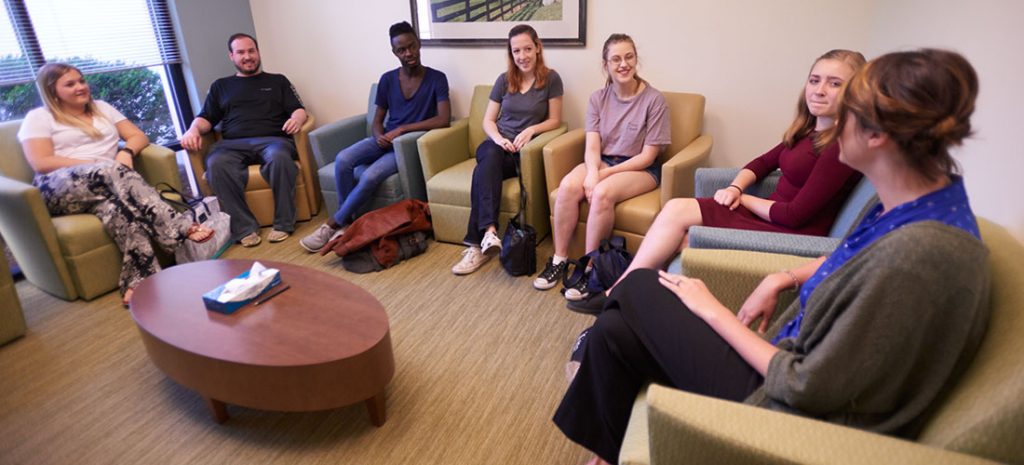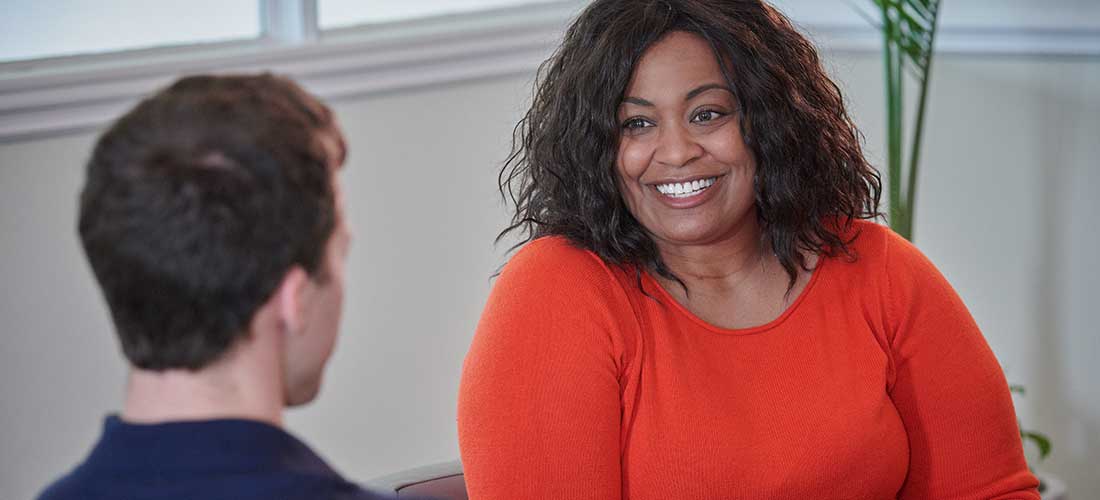Day Treatment Program for Adults 18+
Skyland Trail offers a mental health day treatment program for adults ages 18 and older. Day treatment is also known as partial hospitalization program (PHP).
Clients in treatment live at home and come to the Skyland Trail campus for treatement Monday through Friday. Day treatment is a full day program that requires clients to step away from work, family, and day-to-day responsibilities for a period of time.
Clients who admit to our residential treatment program typically spend about two months at the residential level of care before stepping down to day treatment. Each client moves at their own pace, and changes in level of care are determined by the treatment team.
When a client transitions to PHP, usually their primary counselor, psychiatrist and peer group stay the same. However, clients are expected to use skills more independently and manage their own medications. Some day treatment activities overlap with residential treatment program activities, while others are designed to help day treatment clients use and practice their skills to prepare for returning to the community.
Transitional housing may be available for clients stepping down to day treatment. Note that clients in our dual diagnosis recovery community are not eligible for transitional housing and likely will be referred to a recovery residence in the community to provide additional support as they complete the day treatment program.
Our psychiatric day treatment program in Atlanta often is recommended when:
- traditional outpatient care or weekly outpatient therapy is not successful
- clients are likely to adhere to medications and fully participate in treatment
- clients have a lower risk of impulsive behaviors and suicide attempts
Some clients have recently completed a residential treament program with another organization and continue their progress in day treatment at Skyland Trail.
Day Treatment, or partial hospitalization (PHP), is not appropriate for someone leaving a locked inpatient facility or hospital, or for individuals experiencing psychosis or frequent thoughts of suicide.
Clients admitting directly to day treatment must live in Metro Atlanta.
Adults struggling with depression or anxiety who are feeling "stuck" in outpatient therapy may benefit from our intensive cognitive behavioral therapy program. CBT day treatment provides an immersive CBT experience in a therapeutic environment with individualized CBT-focused psychiatric care.
During the admissions process, our clinical team will recommend an appropriate level of entry for a new client.
Expected Length of Stay in PHP

On average, clients participate in the day treatment program for about 2 months. (Our minimum length of stay is 8 weeks.)
Most clients step down to our Intensive Outpatient Program (IOP), which offers a slightly shorter day, five days a week, from 11:00 AM to 3:00 PM. The average length of stay in IOP is an additional 1 to 2 months.
The total average length of treatment for clients admitting to day treatment is 2 to 6 months.
Structured Daily Schedules
Day Treatment clients come to the Charles B. West Campus from 10:00 a.m. to 4:00 p.m. each weekday for psychiatric services and therapy sessions.
While multiple groups are offered each hour, counselors work with each mental health day treatment client to develop an individualized schedule based on the client's diagnoses, as well as identified opportunities for growth and skill building.
Clients have one-on-one sessions with a dedicated psychiatrist and a specialized primary therapist each week.
Clients attend a core group session daily with a consistent group of 10-15 peer clients. Clients also participate in classroom-style educational sessions to learn more about their illness and how they can apply coping strategies and skills that are proven to be effective.

We take an integrated, holistic approach to our mental health day program
Complementary adjunctive therapy sessions – art, music, horticulture, and recreation – encourage client engagement in therapy and give clients opportunities to practice the skills they are learning in their individual and core group sessions.
Weekly schedules also include groups focused on workforce and school readiness, work-life balance, nutrition counseling, sober living, mindfulness, healthy relationships, exercise and sports, and positive use of free time.
Our integrated, holistic model is what makes Skyland Trail unique, successful and nationally recognized. All the components of our programs - from expert psychiatric care to art and gardens to fitness training - work together to help our clients reclaim their lives.
By helping them define who they are and who they want to be in addition to helping them develop practical skills for managing their mental illness, we give our clients the best chance at stopping the cycle of repeat hospitalizations and moving forward toward a healthier future.
One-on-one sessions with a psychiatrist
A dedicated psychiatrist will help find a medication strategy for bipolar disorder (and other co-occurring disorders) that works for you. Medications are essential and effective in controlling symptoms of bipolar disorder. While there is no one recipe for success, as a top treatment center for bipolar disorder, our psychiatrists are all skilled at developing an effective medication strategy for each client, one that improves mood, concentration, and energy; prevents manic episodes; and minimizes side effects.
One-on-one sessions with a therapist
Clients are matched with a dedicated therapist with specialized experience in treating bipolar disorder
Healthy Eating and Active Living
Multidisciplinary treatment team includes a dietician and personal trainer to help clients adopt a whole person approach to health
Art, Music, and Nature Therapy
Hands-on groups led by experts that help clients explore strategies for self care and self expression
Skills and Education Groups
Learn about your disorder and skills for preventing and managing manic and depressive episodes
Peer Support & Specialized Groups
Specialized groups support clients who identify as LGBTQ or BIPOC as well as clients in similar stages of life or with similar challenges, for example clients who are parents, clients who are experiencing grief or loss, or clients working toward sobriety.
What does our campus look like?
Take a 360 virtual tour of the Charles B. West Campus.

